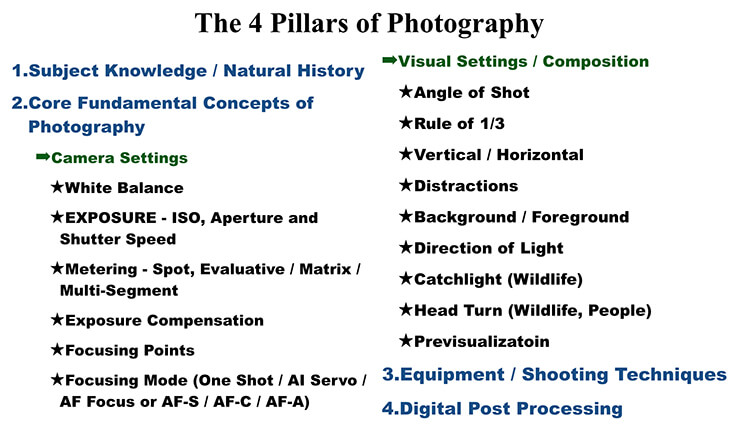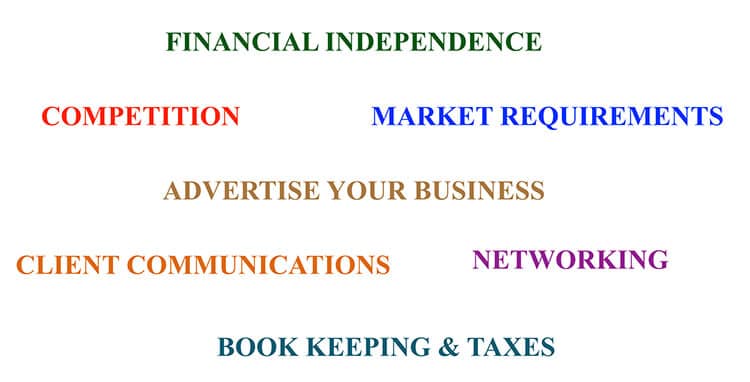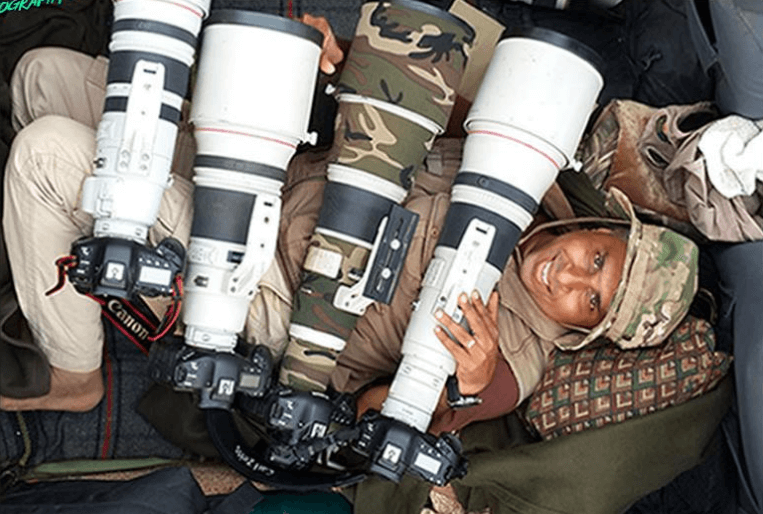This image may evoke different emotions in different people, but if you are an aspiring photographer, that emotion is more than likely to be one of “envy.” And I know this because I have been on the other side of this image for the better part of my youth. I know what it is like to carry around a basic entry-level camera during a safari and drool at another photographer’s long lens.
Well, envy may be a good start to fuel your desire for more equipment; but to pursue photography as a profession you are going to need a lot more than that. As with most things in life, you do not succeed overnight. And it’s neither easy nor practical to quantify your efforts. Yes, it took me over 20 years to get somewhat close where I wanted to be; it may take the next person 10 years. But that’s hardly the point. For me, the ruling sentiment has always been, “profession or no profession, photography is what I want to do.” If you can be that passionate, if you are up for backbreaking hard work, if you are unfazed by minor setbacks and disappointments, then delve right in.
So let me cut straight to the chase and chart out the course to embracing photography as a profession.

Genre of Photography
The tendency in beginners is to shoot practically anything and everything. While this can be a good thing to start with, it is important to quickly figure out which genre of photography you want to focus on, eventually. By all means, be a Jack of all trades but also be a master of ONE. Be it street photography, wedding, product, fashion, landscape, or wildlife photography, each genre presents its own challenges. Consider the advantages and disadvantages and your own aptitude before you pick a genre.
Understanding the 4 Pillars of Photography

A solid grounding in what I call the four pillars of photography cannot be over emphasized. This will clearly raise the standard of your photography, several notches.
1. Subject Knowledge
There is no undermining the importance of subject knowledge, regardless of the genre of photography. For instance, a good wildlife photographer needs to be a good naturalist first. A wedding photographer has to be familiar with the finer nuances involved in the wedding ceremonies. This is true of all genres. Once you have a sound understanding, you can visualize and plan your shots.
2. Core Fundamental Concepts of Photography
The digital camera has, in a sense, over simplified photography. With superior technology being made affordable, ‘taking’ an image is no longer a challenge. ‘Making’ an image, on the other hand, requires a deeper understanding and a definite thought process. Sample this – there are at least 18 different parameters you need to work on, before you press the shutter release button. So take the time and effort to know the key settings inside out; work on and experiment with the guidelines of composition. It is important to get the basics right.
3. Equipment and Shooting Technique
Equipment needs vary with the genre of photography. Understand your camera and lens, exploit their advantages and work around their limitations. Be aware of the various accessories that might aid your genre of photography. An optimal equipment set-up with the right shooting skills, and lots of practice will all contribute to superior image quality.
4. Digital Post Processing
The fourth, and most often overlooked, pillar of photography is post processing. This usually carries a negative connotation and is largely considered ‘manipulation.’ I take great pains to clear the air in this regard. Post processing is the digital counterpart of the chemical processing of film rolls and is an integral part of digital photography. Aim to familiarize yourself with post processing techniques early on in your career, so as to create top-notch images.
Building your Portfolio/Social Presence
Having chosen your genre and mastered the four pillars of photography (although learning is a lifelong affair), it is now time for you to showcase your work.
 Once you have a sizeable portfolio, you can either display it on one of the free content management systems available or get a professional to do it for you. A useful tip here would be to use your own name for your website, rather than fancy monikers. Over a period of time, this makes it easier for people to connect the domain name to you. I have used www.pixpa.com to host my portfolio (www.sudhirshivaram.com); it was a breeze to set up.
Once you have a sizeable portfolio, you can either display it on one of the free content management systems available or get a professional to do it for you. A useful tip here would be to use your own name for your website, rather than fancy monikers. Over a period of time, this makes it easier for people to connect the domain name to you. I have used www.pixpa.com to host my portfolio (www.sudhirshivaram.com); it was a breeze to set up.
You should also harness the global reach of social media sites to display and promote your work. You can share and interact within a group of likeminded individuals and build a network for yourself. Facebook has been instrumental in shaping my decision to take up photography as a profession. Flickr, Google+, 500px, Nat Geo Your Shot are some other platforms where you can frequently post your images.
Business of Photography
Once you have tackled the nitty-gritties of your craft, it is now time to roll up your sleeves and attack the business end. I have outlined these points based on my personal experience.
 Financial Independence
Financial Independence
A hobby can become a passion; the passion can become your calling! While the bigger thoughts clearly are on doing what one loves, it is paramount to assess one’s financial requirements for sustenance, lifestyle and the rainy day. This is vital for a smooth transition from a salaried job to entrepreneurship.
“Mspace Group” – An organization that focuses on helping individuals gain financial independence helped me acquire this important life-skill, and greatly bolstered my decision to quit my IT corporate job and get into photography as a full time profession.
Market Requirements
You may be your own boss now, but there’s no ignoring the client. Understand customer requirement and deliver accordingly, within the ambit of your business. Do your homework and be current on new trends and technologies. Obsolescence may prove bad for business.
Competition
There’s nothing like a little competition to spice things up. Healthy competition can actually be a good thing. It ensures that you do not get complacent; you learn to work hard, work smart. Study your competition, follow their work, and do not shy away from emulating them, cautiously.
Advertise your Business
This may seem like an extension of “Social Media Presence” that I touched upon earlier but the difference here is that you will need to pay to garner visibility for your business. Let the size and scale of your business determine your advertising/marketing budget. As for me, strategically planned advertising on social media sites has been the mainstay of my business.
Client Communications
Unable to stick to a timeline? Communicate. Goofed up on an assignment? Communicate. Forgot to call? Communicate. And apologize. “When in doubt, communicate” is a good life lesson; more so with clients. Timely communication is undoubtedly the key to business success.
Networking
“We’re all in it together,” is not just a happy thought but can make sound business sense too. Networking here refers not just to your Facebook friends and contacts but also to real-world connections. Networking with relevant people keeps you abreast of the goings on in the industry. Attend seminars, exhibitions, and other such events to network with individuals and companies. You will eventually learn when to collaborate and when to go solo.
Bookkeeping and Taxes
It is not all sunshine and roses. Before you know it, the taxman will come knocking. So keep a tab on your income/expenses and file your returns on time. There is no escaping this humungous mundane task.
Author’s Conclusion
I worked in the IT sector for almost 17 years before I jumped the boat to full-time photography. So, is it a good thing or a bad thing? Definitely a good thing, I would say. I owe most of my technical expertise to my academic background as an engineer. Most other management skills, I attribute to my long innings in the corporate sector.
If you have your heart set out on photography as a profession, do give it a serious thought. Ponder some more. Pepper your passion with wisdom. Patience and perseverance go a long way. If you are a student, my suggestion would be to complete your education, find the means to support yourself and your family, and in parallel pursue your passion. For those of you who are working elsewhere and are contemplating photography as a profession, here is a saying that moved me profoundly:
“Life is not about what you couldn’t do so far, it’s about WHAT YOU STILL CAN. Life isn’t about finding yourself, Life is about CREATING yourself.”
Good Luck!


